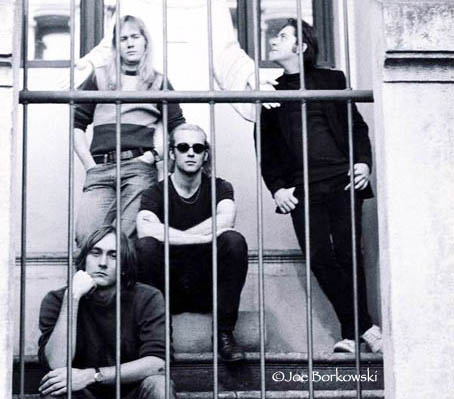I seriously considered ending the post there; a ridiculously short post for a ridiculously short song. So, how short is this darn thing, anyway? Wikipedia gives an official length of 1.136 seconds. iTunes claims a length of 0:05, but that includes the dead time between it and the next song on the album. The label of the vinyl single reads a concise (0:01), which was probably the band’s initial intent. But it almost seems pointless to debate the issue.

“Intent” is an interesting word, when you consider how much of a throwaway this track is. In fact, the session that produced this was written off and tossed away by the majority of the participants. Stories about this song – and the album it’s culled from – are the stuff of legend. Albert Mudrian’s book: Choosing Death: The Improbable History of Death Metal & Grindcore does a good job collecting stories and documenting the era. (I found earlier chapters in that book far more interesting than later ones, which is an accurate way of describing death metal and grindcore in general.)
This track comes from Napalm Death’s first album, Scum, which is actually split into two separate recording sessions with two different lineups; the only common thread
 between the two sides is drummer Mick Harris. “You Suffer” is the final song from the first session, which, along with Harris, includes guitarist Justin Broadrick and bassist/vocalist Nik Bullen. The session was initially intended to be a demo, but internal friction caused this version of the band to break up before it could be shopped around. Not expecting Harris to re-form the band with a completely new lineup, Broadrick gave the demo tape away – for free – to Earache label owner Digby Pearson. The rest, as they say, is (improbable) history.
between the two sides is drummer Mick Harris. “You Suffer” is the final song from the first session, which, along with Harris, includes guitarist Justin Broadrick and bassist/vocalist Nik Bullen. The session was initially intended to be a demo, but internal friction caused this version of the band to break up before it could be shopped around. Not expecting Harris to re-form the band with a completely new lineup, Broadrick gave the demo tape away – for free – to Earache label owner Digby Pearson. The rest, as they say, is (improbable) history.“You Suffer” became quite a curiosity at the time for outsiders. The band always saw the track as some kind of joke, and would often play it 30, 40, 50 times in a row at early live gigs. I guess it could be considered a (very) brief moment of levity among their more politically charged songs. John Peel’s early championing of the band garnered them some more attention from the British media, perhaps culminating bizarrely in the band winding up on the BBC educational television program What’s That Noise? (The show’s title sounds tailor-made for Napalm Death, doesn’t it?)
This is not meant to be a bio of the band; if you’re further interested in the history behind this song, I recommend the above-linked book as well as the band’s first two albums – Scum and From Enslavement To Obliteration. Sadly, at the time, neither of those were distributed in the United States; most Americans didn’t get their first taste of the band until Harmony Corruption
 – a decent album, but the band had re-vamped its lineup yet again, veered away from grindcore and transmuted into a far less interesting death metal outfit. The development of American underground metal would have been very different had those earlier albums had more widespread availability at the time. Oh well. C'est la vie. Just remember, by the time you finish reading this entry, you could have listened to the song approximately fifty times.
– a decent album, but the band had re-vamped its lineup yet again, veered away from grindcore and transmuted into a far less interesting death metal outfit. The development of American underground metal would have been very different had those earlier albums had more widespread availability at the time. Oh well. C'est la vie. Just remember, by the time you finish reading this entry, you could have listened to the song approximately fifty times.










